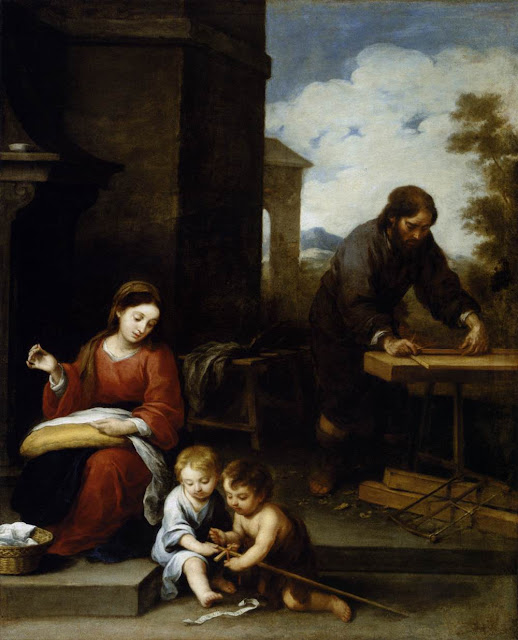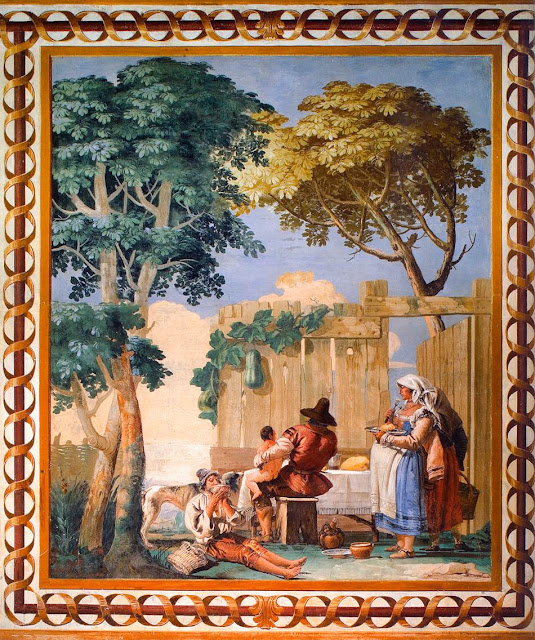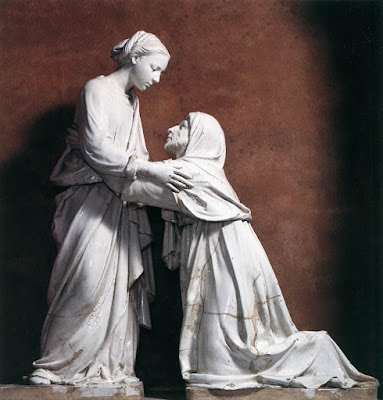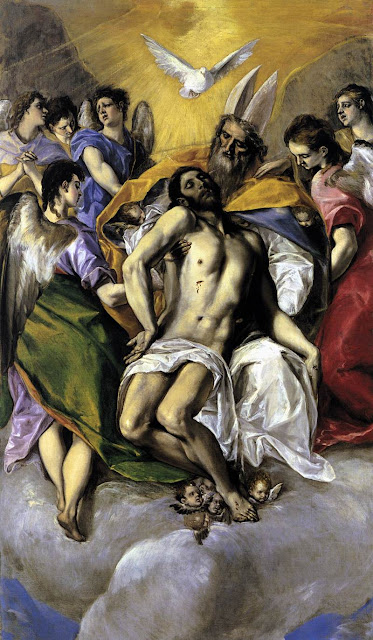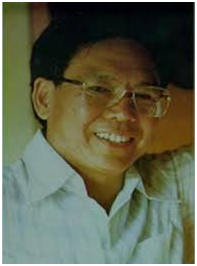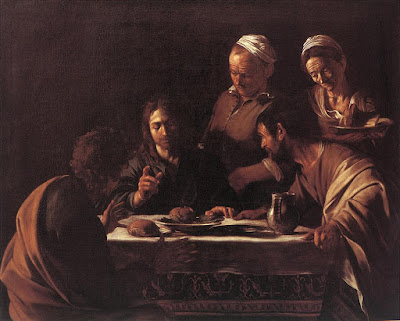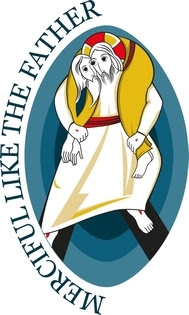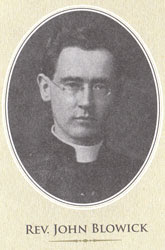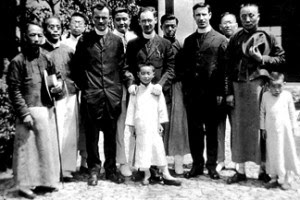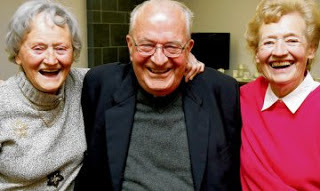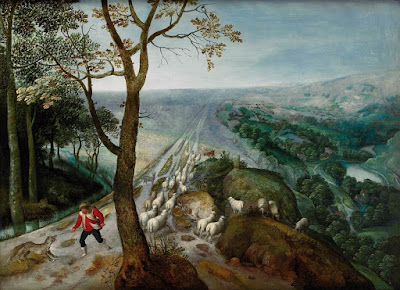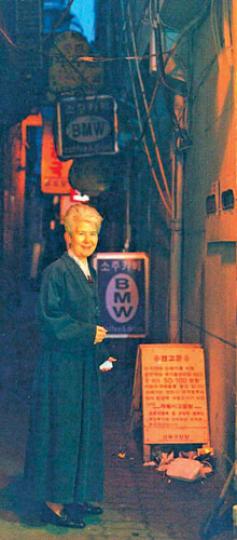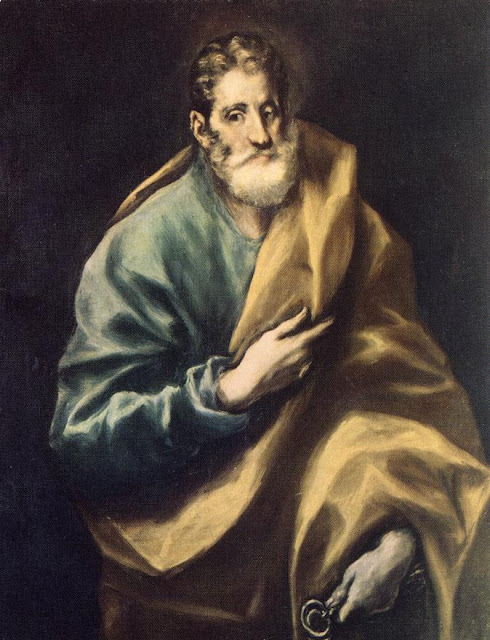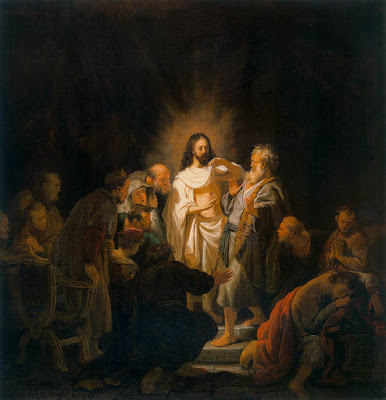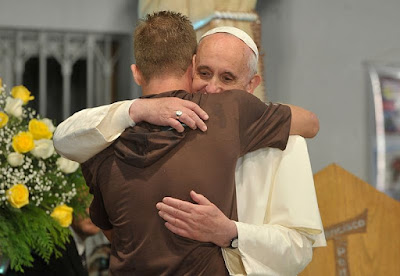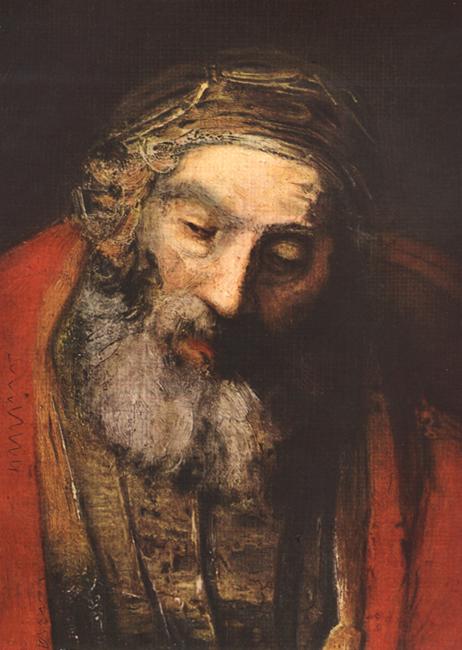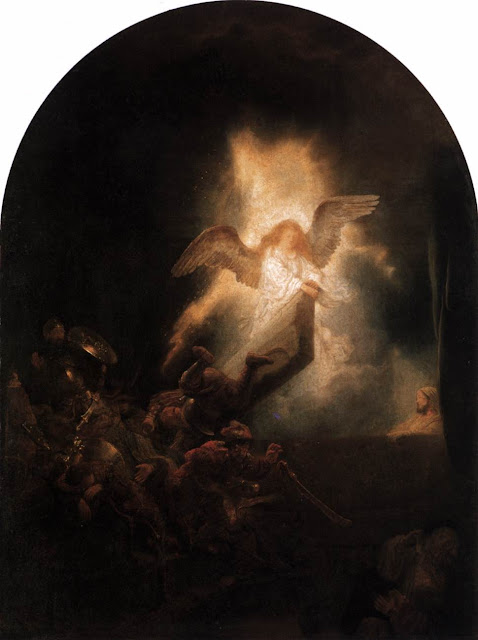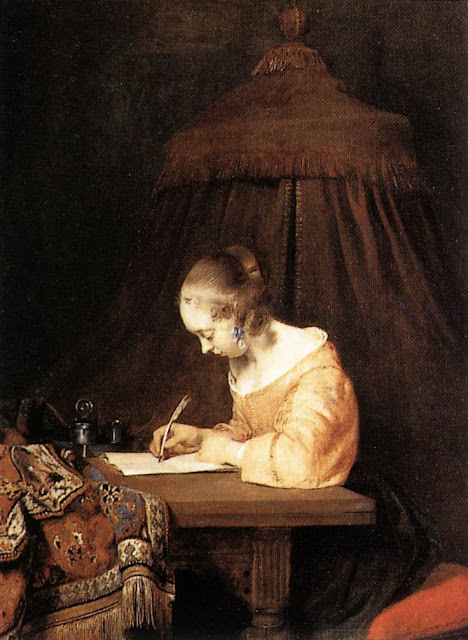‘In the most blessed sacrament of the Eucharist . . . the whole Christ is truly, really, and substantially contained.’ Sunday Reflections. Corpus Christi Sunday, Year C
Sheaves of Wheat, Van Gogh, 1885
Rijksmuseum Kröller-Müller, Otterlo, Netherlands [Web Gallery of Art]
‘Fruit of the earth and work of human hands,
it will become for us the bread of life.’
Corpus Christi Sunday
Readings (New American Bible: Philippines, USA)
Readings (Jerusalem Bible: Australia, England & Wales, India [optional], Ireland, New Zealand, Pakistan, Scotland, South Africa)
Gospel Luke 9:11b-17 (New Revised Standard Version, Catholic Edition, Canada)
When the crowds found out about it, they followed Jesus; and he welcomed them, and spoke to them about the kingdom of God, and healed those who needed to be cured.
The day was drawing to a close, and the twelve came to him and said, “Send the crowd away, so that they may go into the surrounding villages and countryside, to lodge and get provisions; for we are here in a deserted place.” But he said to them, “You give them something to eat.” They said, “We have no more than five loaves and two fish—unless we are to go and buy food for all these people.” For there were about five thousand men. And he said to his disciples, “Make them sit down in groups of about fifty each.” They did so and made them all sit down. And taking the five loaves and the two fish, he looked up to heaven, and blessed and broke them, and gave them to the disciples to set before the crowd. And all ate and were filled. What was left over was gathered up, twelve baskets of broken pieces.
Ninth Sunday in Ordinary Time, Year C
In countries where Corpus Christi is observed as a holyday of obligation on the Thursday after Trinity Sunday
Readings (Jerusalem Bible)
+++
Corpus Christi. Responsorial Psalm (NAB Lectionary; Philippines, USA)

Chapel at the University of the East, Manila
Before fire on 1 April 2016

After fire
At 9:00 am on 1 April John Lambert Minimo, a 20-year-old student at the University of the East (UE), Manila, where he is the Overall Student Responsible in Campus Ministry, got a phone-call from a fire volunteer friend, John Paul Justin Aquino. UE is on fire, John Paul said. The first and only thought that came into Lambert’s mind was the Blessed Sacrament in the chapel because it is the True Body of Christ, as he later wrote.
Lambert rushed to university but the campus guards wouldn’t let him in. He contacted Fr Bernard Martin, the UE chaplain, at the Columban house but told him not to come as the fire was still raging. Fr Martin turned 85 that day. There were no classes as the academic year had ended a week or two before. The young man, who prepared everything for Mass each day, felt a certain helplessness but prayed as he waited at the gate, Lord, I will save you no matter what happens.
By noon the fire was out but John Lambert’s cellphone was dead by then and he had no money to buy lunch. He still waited. It was three in the afternoon before he was able to get to the chapel as a clearance was needed from the Bureau of Fire Protection. And not everyone seemed to understand why he was so anxious to save the Blessed Sacrament. A number of people told him to go home.

Crucifix and tabernacle after the fire
Finally, at 3:00 pm Lambert, accompanied by a school official and a security guard, was able to enter the chapel, which had been badly damaged. But the crucifix behind the altar hadn’t even been charred and the tabernacle was safe.
Lambert wrote, I genuflected as a sign of reverence to the Lord. I started to sing hymns we use at Mass. I went immediately to the sacristy to get as many corporals as I could to wrap the pyx that contained the Blessed Sacrament. I gave the Paschal Candle to the security guard. Wearing my sotana, I approached the tabernacle. As I opened it, I sang “O Sacrament Most Holy, O Sacrament Divine.” I wrapped the pyx and placed it in my pocket so that I could take it to the Columban house.
Before I left I looked up at the crucifix. It was as if the Lord was saying to me, ‘Lambert, anak (son). Don’t worry, I am still here. I’m safe. You can take me. We conquered the fire, I stood up and I am here.’ That was a moment I will never forget. The Lord spoke clearly to my heart.
O Sacrament Most Holy
A UE van took Lambert and his friend John Paul to the Columban house. As we travelled, we started to pray and continuously sing ‘O Sacrament Most Holy’. I felt tired. My head continued to ache, I was very hungry and my hands were shaking. But I continued to embrace the Blessed Sacrament tightly. When they reached the Columban house at around 4:00pm Fr Martin placed the Blessed Sacrament in the chapel there and Lambert and John Paul then joined the birthday celebration.

Fr Bernard Martin with Lambert (r) and Beth Briones (l) at UE Campus Ministry
Beth spent some years in Fiji as a Columban Lay Missionary
It was an experience that I will never forget, wrote Lambert. Out of my love for the Blessed Sacrament, I would do anything for Him, even in the simplest way. Even in the toughest moments the Lord is always there to remind me and call me anytime He needs my help.
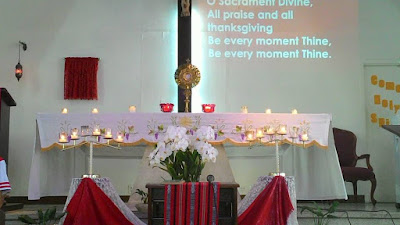
Exposition of the Blessed Sacrament, UE Chapel
Each time the Holy Sacrifice of the Mass is offered in the chapel of UE, as in every other church, the bread and wine brought to the altar at the offertory become the Body and Blood of Christ. They’re not ‘symbols’ of this. They are the Body and Blood of the Risen Lord Jesus. As the Catechism of the Catholic Church, No 33, puts it, At the heart of the Eucharistic celebration are the bread and wine that, by the words of Christ and the invocation of the Holy Spirit, become Christ’s Body and Blood.

Paul Comtois, (1895-1966)
Fifty years ago, just after midnight 21/22 February 1966, a fire destroyed the official residence of Paul Comtois, the Lieutenant Governor of Quebec, Canada, the official representative of Queen Elizabeth of Canada who lives in England, where she is also Queen. Lieutenant Governor Comtois had been given permission, reluctantly, by the Archbishop to have the Blessed Sacrament in the chapel in his residence. He prayed there every night
Like John Lambert Minimo, he immediately thought of the Blessed Sacrament when the fire broke out. Having made sure that others in the house were safe he went to the chapel, already in flames. He was able to rescue the Blessed Sacrament but didn’t make it to safety. The pyx containing the Blessed Sacrament was found, untouched by the flames, under his charred body.
Canadian priest Fr Raymond de Souza wrote last March in National Post, one of Canada’s dailies, Paul Comtois, the former lieutenant governor of Quebec, was a different kind of martyr. He was not killed by the hatred of others; rather, he was motivated by his own love of Christ. He might be considered a martyr for the Eucharist.
I might have missed it, but it didn’t seem as though anything was done last month, by either church or state, to mark the 50th anniversary of his death on Feb. 22, 1966. And his story is one that needs to be told.
Fr de Souza quotes from an article by Andrew Cusack in which a family friend, Mac Stearns, relates: His tremendous religious faith impressed me greatly and was no doubt instrumental in my embracing the Catholic faith some time after his death. Knowing his great fervor for the Blessed Sacrament, I have no doubt whatsoever that Paul would do all in his power to rescue the Holy Eucharist from the fire.
The reason for the death of Lieutenant General Comtois was ignored at the time not only by the secular press but by the Catholic press. Cusack quotes Sr Maureen Peckham RSCJ writing in 1988: Yet, Paul Comtois was a man of the world, a well-known socialite, one who had reached the heights of worldly glory; he was one whom the world could recognize as its own. Furthermore, his chivalrous and brave death should, even on the human and wordly level, have merited the title of hero. That he, who had been honored by the world during his lifetime, should have been ignored by the world at the moment of his death, can only be explained by the fact that he died for One Whom the world does not recognize and has ever refused to acknowledge.
I had never heard of Paul Comtois until quite recently when I came across his story on the internet. I’m sure that young Lambert had never heard of him either until I sent him a link the other evening to this wonderful story. God did not ask Lambert to give his life but he has given him a deep faith in the Real Presence of Jesus Christ, as he did Paul Comtois. As the Catechism of the Catholic Church, No 1374, teaches: The mode of Christ’s presence under the Eucharistic species is unique. It raises the Eucharist above all the sacraments as ‘the perfection of the spiritual life and the end to which all the sacraments tend.’ In the most blessed sacrament of the Eucharist ‘the body and blood, together with the soul and divinity, of our Lord Jesus Christ and, therefore, the whole Christ is truly, really, and substantially contained.’ ‘This presence is called “real”- by which is not intended to exclude the other types of presence as if they could not be “real” too, but because it is presence in the fullest sense: that is to say, it is a substantial presence by which Christ, God and man, makes himself wholly and entirely present. [Emphasis added.]
It is that Presence of the Risen Lord Jesus Christ in the Blessed Sacrament that the Church celebrates today.




Corpus Christ Procession, Appenzell, Switzerland
[Thanks to Fr Oliver Quilab SVD on FB for photos]
Antiphona ad communionem Communion Antiphon John 6:57
Qui manducat meam carnem et bibit meum sanguinem,
Whoever eats my flesh and drinks my blood
in me manet et ego in eo, dicit Dominus.
remains in me and I in him, says the Lord.




